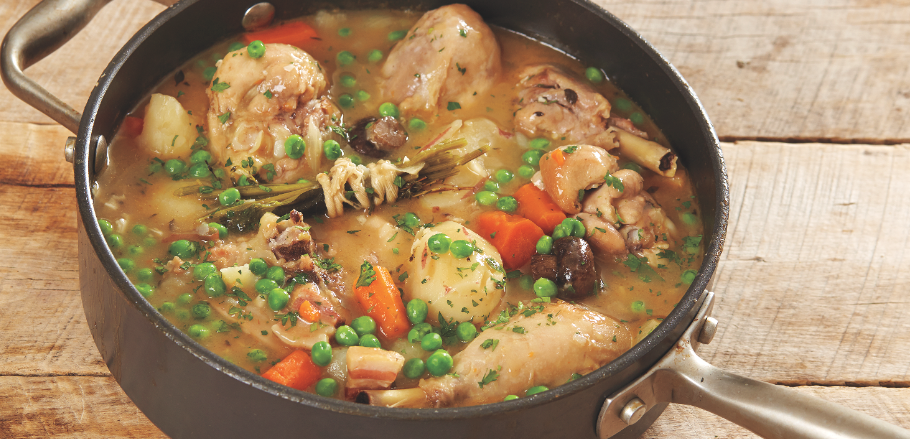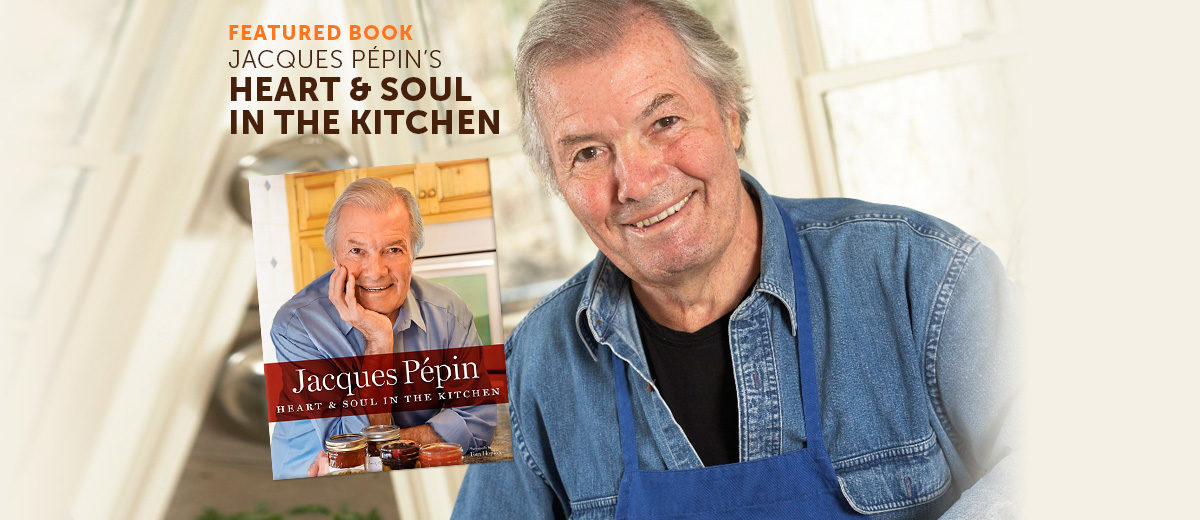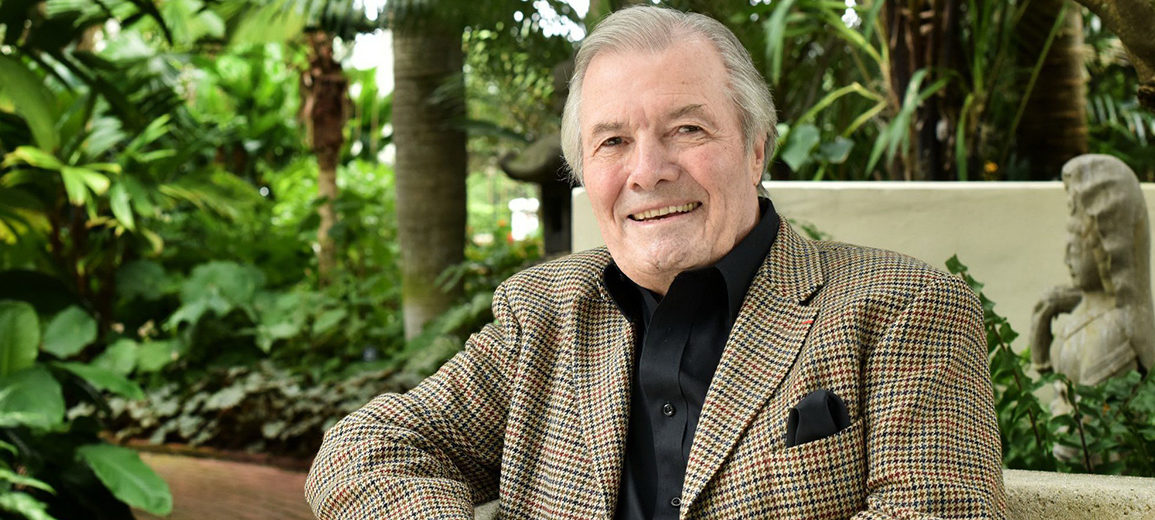Chef’s Roll was honored to have a phone interview with famed chef Jacques Pépin. When compiling our list of questions, we reached out to our community of chefs to see what they would ask a living legend. Thank you to Jacques for taking the time to speak with us and to his publicist Carrie Bachman for arranging this occasion.
What is the best piece of advice you can give someone who is just starting their career in the kitchen?
The best piece of advice is to be consistent. The best piece of advice is to not to look for notoriety. I mean, when I was a kid, the food channels didn’t exist, and the cook was at the bottom of the social scale. So you did what you were told, and you did it because it gratified you, and you were happy with it, and that’s it. And so, you have to go in this business for the love of the business. Not anything else, otherwise you’re bound to failure and disappointment.
What is the most valuable thing you have learned during your years in the kitchen?
The most valuable thing is to really go back to the essentials, and look at food for what the food is. Look for quality ingredients and go from there. Don’t try to torture the food too much.
Do you have any regrets about the journey you have taken as a chef?
No, I have been blessed, I’ve been gratified, and I’ve been successful. So a lot of people with my talent haven’t had the chance that I have, so no, I’m very happy with what I did.
When making your menus or recipes, how much influence do you let others outside of your kitchen have?
I feel that it is usually a pretty lonely journey, except if I have anyone else coming in to eat. It is probably at the beginning when I get an idea then I talk with a chef friend of mine, or if I eat something somewhere and think that it was a good idea, I ask, “what did you do?” and they tell me. Oh, I said, gee, that gives me an idea. So you know, I’ll get an idea from someone else, I’ll get an idea from reading something, from eating something, or from the market. And after that, I don’t have a staff. I have known my assistant (Norma) for the last 35 years, and she doesn’t really cook with me or anything. So if I go to the market today, I see some artichokes or something interesting, I’ll come home and I cook for my wife then I write it down on a yellow pad. If it works out, then I say that I give it to Norma tomorrow, she types it, and I write an introduction, do a couple of corrections, and I have a recipe. Usually, I help in the layout of the book and I write the introductions to the recipes, so usually it’s a one-person operation. I mean, I’m not saying that it’s better or worse, if I had a restaurant, I see food that I would take, I would take my own staff and all the knowledge of the restaurant to bring into my food, but I don’t have that. So the meals I write for myself.
How do you keep your passion and spirit going throughout your culinary career?
I’m hungry all the time. So I cook basically every day except when I’m on the road. And I like to teach. I’ve been teaching at Boston University for 33 years, and the ITC in New York for close to 30. So now I teach my granddaughter. I like to teach, and if I have an idea, I put it on paper and I keep going. I mean, I don’t really look that much into new trends or new fashion, so with that being said, after more than half a century in America, I wouldn’t say that my food is French. Most people, they do look at me as a quintessential French chef, but you look at my latest book, and we ate what we ate at home, and that can grow from chirashi sushi to a salmon with miso, to southern fried chicken, and to a pasilla soup, or the chicken jardinière of my mother. So it’s all over the place there. I didn’t try to have a thing for that book, I just kind of reminisce on what we’ve been eating, and I’ve been married 50 years.

If you hadn’t pursued your passion for cooking, what do you think you would’ve become and why?
I probably would be a cabinet maker. I left home when I was 13 years old. Well, my mother had a restaurant, and my father was a cabinet maker. At that time, there was no television, of course there were no computers, we didn’t have any magazines, we didn’t even have the telephone. We didn’t have any movie, so I didn’t know that I could be a great doctor in like 30 minutes, how we do on television. So I had blinders, the key to the way I was at the time, I look in front of me. On one side, my father, a cabinet maker, on the other side, my mother, it was one or the other. I never even thought that I could be a doctor or an architect. That was my life at that point.
What is your favorite place to travel and why?
Well, my favorite place to travel is back home, when I’m anywhere, so that’s really the question, the place where I am, especially at my age. With that being said, we just sold an apartment we had in Playa del Carmen in Mexico, and I loved it there, and I did a lot of cooking from there. I love the south of France, that is a very great place. I love Turkey, I love Málaga in the south of Spain. So I don’t know, I love the west coast, I love San Francisco, there’s many, many places that I love. I feel welcome and I have friends there. Last week I was in Phoenix, and I had a great time. So this is not like it’s different. One place is different from the other, but there’s many, many places that I love in the world, and it has a great deal to do with the people I meet there, I know there, also with the food.
A classic question that we’re sure lots of chefs are asked, but we have to know. What would your last meal on earth be?
Yes, I’ve had that question. First if I think that when I die, I probably wouldn’t have much of an appetite, but if I have to, the last meal is going to be a very, very, very, very long one. Maybe a year or so, a very, very long meal. And in that meal, starting with the things that I love. I will keep eating bread and butter, I don’t think there’s anything greater than if you have the most fantastic bread that you can find, the greatest butter, it’s going to be hard to beat. But that may be followed by a hot dog and a lobster roll and maybe a can of caviar. And probably squab with peas. So old dishes like ham and egg, I love ham. So all of those dishes that I love, that would be part of my very long last meal.
Can you tell us who the most influential chef has been in your life, and why that person has been an impact?
Well, since being in France, my mother. She was in that business, there were seven women in my family with seven restaurants at some point, I was the first male to go into that business. So I am very interested early in the kitchen, and that’s probably thanks to my mother, aunts, and so forth. And then certainly the executive chef at the Plaza Athénée hotel in Paris, Lucien Diat, in the old school I was trained there, I stayed there for almost six years. And when I came to New York, I knew James Beard and Julia Child and Craig Claiborne in less than six months I was there. So the food world was very, very small. I think that the one I was most influenced by was Craig Claiborne, even though many people don’t even know who he is now, unfortunately. He was the food editor of The New York Times and besides cooking, the way he looked at food, and the way he made a lot of people known like Diana Kennedy, the different type of cuisine that he was always obviously eating, so I used to spend my weekend at his house, and he’s often nice, and the casual nature of it, and the democracy in the kitchen in a sense, was much different than what I had experienced in France. And I think that’s one of the reasons I stay in America, and he was very influential in my life.
How was it cooking with Julia Child? You guys seemed like you had such good chemistry on camera.
I met Julia in 1960, 6-0. At that time she hadn’t done any books, she was coming back from France to be at the school that she had in Paris, and she had never written a book, she didn’t write for any magazines, newspapers. She had never done television. So when I knew her, she was totally unknown. In fact, we spoke French the first time I met her, because her French was better than my English…it just came back for me. And so we stayed friends for like 45 years of our lives. So we felt pretty comfortable together, even though we did argue about one thing or another, but it was fun arguments, and we did share a lot of bottles of wine and a lot of meals together, and I think we have basically the same view more or less on what cooking should be. Julia always said that we trained together. And it’s true that she came to France in 1949, and I worked in an apprenticeship in 1949, of course, she was 22 years older than me, but we had the same set of people, the same chef, the same style, and all that she saw in Paris that I experienced myself. And we understood together the importance of the quality of ingredients, the simplicity of a recipe, the taste, certainly the importance of the presentation, and the importance of sharing the food with family, friends. All of those, we agree on, so that was the most important part.



